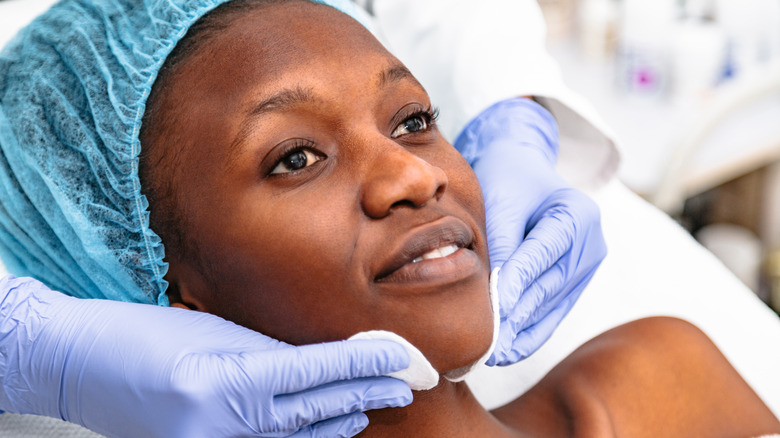What Happens To Your Face When You Get A Chemical Peel
A chemical peel is a cosmetic type of treatment used to improve the texture and appearance of your skin. During this treatment, a chemical solution is applied to the face, neck, or hands to remove dead or damaged skin cells. This causes the top outer layers of your skin to exfoliate and peel off, revealing new and healthier skin underneath (via Healthline). This new layer of skin often feels smoother and appears less damaged than the layer removed.
As a result, many people get chemical peels to help reduce or remove acne scars, sun damage, scars, wrinkles, hyperpigmentation, and uneven skin tone. According to Healthline, chemical peels are typically performed by a dermatologist or plastic surgeon in a doctor's office or surgery center and are generally considered safe. However, not all chemical peels are the same. As it turns out, there are three different types of chemical peels: light, medium, and deep.
Different chemical peels yield different results
According to Cleveland Clinic, the exact results of your chemical peel will largely depend on the type of peel you choose to get. For instance, a light chemical peel involves removing only the outermost layer of your skin. Since this is the most subtle form of chemical peel, it is typically recommended for those who have fine lines, acne, and dry or rough skin. A medium chemical peel will help give your skin a smoother touch by removing both the outermost and upper-middle layers of your skin. This is best for people with age spots, uneven or discolored skin, scarring, and moderate wrinkles.
A deep chemical peel will yield the most noticeable results by penetrating the lower-middle layer of your skin. This is usually recommended for those with deep acne scars, blotchy skin, and extensive sun damage (per Cleveland Clinic). Unlike light and medium chemical peels, the recovery time for deep peels is much longer and requires up to eight weeks of pretreatment. Like any medical procedure, there's always a risk of complications. While rare, chemical peels carry a low risk of scarring, abnormal pigmentation, and infection. Following your doctor's list of post-treatment instructions can help prevent this from happening.


